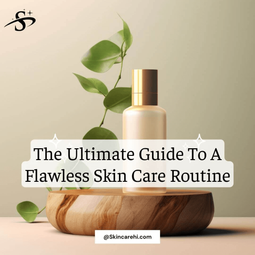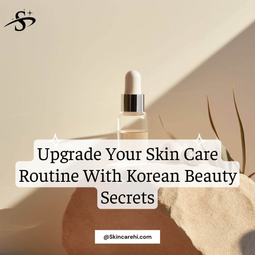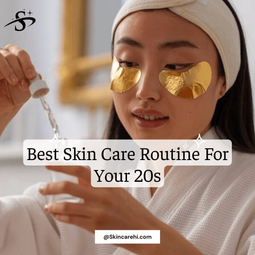Let's navigate the world of clean beauty, explore the science behind it, and empower you to make informed choices for your skin.
What is Clean Beauty in Your Skin Care Routine?
If in the past, the need for skin care was simply to help the skin become more beautiful every day, today, the trend of healthy skin care is with the desire to both own healthy and beautiful skin from within and support building a life path. comprehensive healing. That is clean beauty (clean cosmetics), an effective - safe - responsible skin care trend, satisfying the need for "green living, beautiful skin care routine" of girls who like products that are healthy for mixed skin and the environment.
Clean cosmetics are all products that are non-toxic, environmentally friendly, sustainable and ethically sourced. Beautiful cleaning products are created to protect people, animals and the environment. The main philosophy of clean beauty is that self-care should not come at the expense of anyone else. We have only one life and one action, and it is our duty to respect that in every area of our lives.
Simplicity is key in the concept of clean beauty in your skin care routine. Clean beauty products are free of skin-harming ingredients like parabens, SLS, phthalates, and perfumes/fragrances. The fewer ingredients in hair and skin care products, the better. Similar to when you buy food at the supermarket, you always choose ingredients with few additives because they are usually good for health.
Clean Beauty Demystified: Beyond the Marketing Buzz
Clean beauty is a marketing term used to describe skincare products that are often positioned as "natural," "organic," "non-toxic," or "cruelty-free." These products typically:
Focus on natural ingredients: They prioritize plant-derived ingredients and minimize the use of synthetic chemicals.
Avoid controversial ingredients: Parabens, sulfates, phthalates, and artificial fragrances are often excluded due to potential health concerns (although the science on these is not always conclusive).
Embrace sustainability: Clean beauty brands often emphasize eco-friendly practices and ethical sourcing.
The Allure of Clean Beauty:
There are several reasons why clean beauty appeals to many consumers use in skin care routine:
Health Concerns: People are increasingly interested in using products perceived as safer and less likely to irritate the skin.
Transparency: Clean beauty brands often emphasize the ingredients used and their origins, appealing to consumers who value transparency.
Ethical Considerations: The focus on sustainability and cruelty-free practices resonates with those who want to make conscious choices.
The Science Behind Clean Beauty Claims:
While the concept of clean beauty is appealing, it's important to approach it with a critical eye:
Natural Doesn't Always Mean Better: Natural ingredients can also be harsh or irritating to the skin.
Safety Depends on Ingredients, Not Labels: Clean beauty doesn't guarantee safety. What matters most is the specific ingredients used and their potential risks.
Focus on Efficacy: Ultimately, your skin care routine should be effective. Don't sacrifice results for a "clean" label if a product with some synthetics works wonders for your skin.
Clean Beauty: A Matter of Personal Choice
There's no right or wrong answer when it comes to clean beauty. Here's how to navigate the trend and find what works for you:
Know Your Skin: Understand your skin type and specific concerns.
Research Ingredients: Educate yourself on the ingredients you are using in your skin care routine, regardless of whether they're natural or synthetic.
Focus on Results: Don't be afraid to experiment and find products that deliver visible improvements for your skin.
Listen to Your Skin: Pay attention to how your skin reacts to different products. Discontinue use if you experience irritation.
Building a Skin Care Routine That Works for You
Here are some key considerations for building a successful skin care routine:
Cleansing: Wash your face twice daily with a gentle cleanser suitable for your skin type.
Moisturizing: Hydration is crucial for all skin types. Choose a moisturizer that addresses your specific needs (lightweight for oily skin, richer for dry skin).
Sunscreen (Daytime Only): Sun protection is non-negotiable. Apply a broad-spectrum sunscreen with SPF 30 or higher every single morning.
Targeted Treatments: Consider serums or masks to address specific concerns like acne, wrinkles, or hyperpigmentation.
Clean Beauty: A Trend or a Transformation?
The clean beauty movement has sparked a conversation about ingredient transparency and ethical practices in the beauty industry. While the term itself may be open to interpretation, it has empowered consumers to become more informed about the products they use. Ultimately, the best skin care routine is the one that works for your unique skin, regardless of whether it falls under the "clean" label. Focus on understanding ingredients, prioritize efficacy, and listen to your skin's needs. With knowledge and a bit of experimentation, you can create a personalized routine that keeps your skin healthy and radiant.
Source: Team SkinCareHi (SC2) compiled, analyzed and wrote. Pls dont reup without source. Many thanks!




